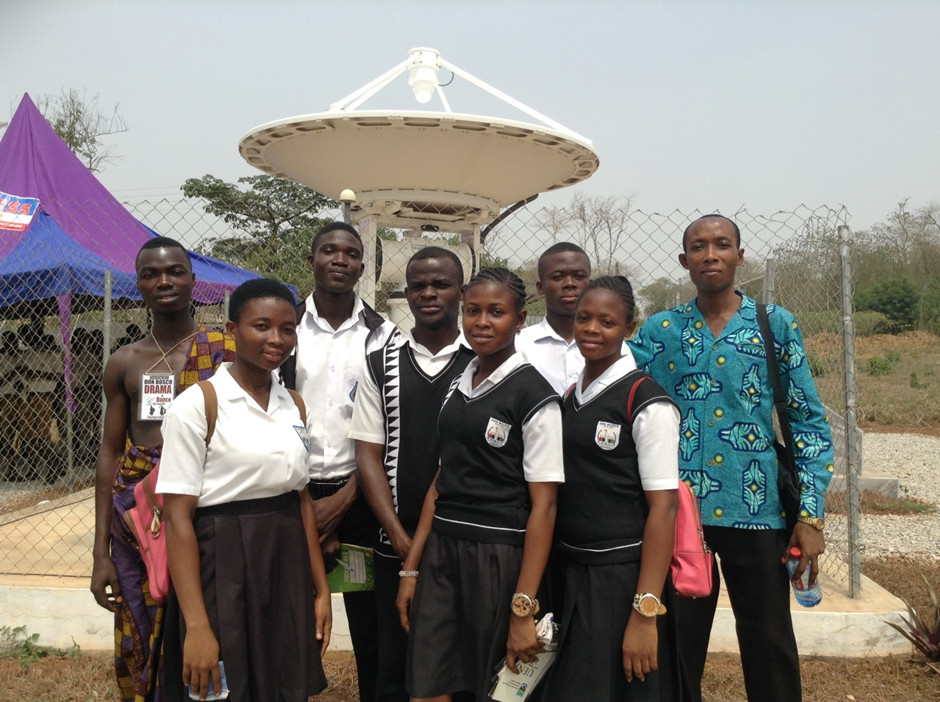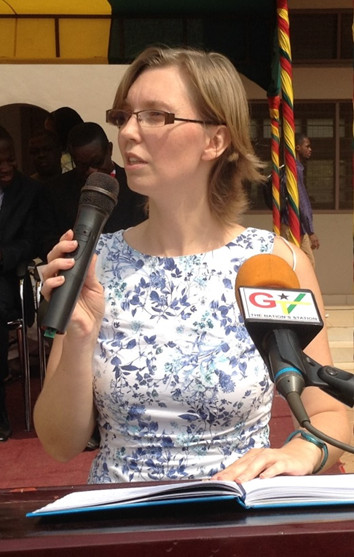Blog / Kamila Kabo-Bah / July 22, 2019
Dr. Kamila Kabo-Bah from the Earth Observation Research and Innovation Centre at the University of Energy and Natural Resources in Ghana discusses ways to promote gender equality in Earth Observation and Natural Sciences.


The University of Energy and Natural Resources (UENR) celebrated the third edition of The Science Festival in Ghana. The three-day celebration reached over 1000 participants and students to promote the study of science and maths to young people in the country. It specifically aimed to inspire female students to develop an interest in Science, Technology, Engineering, Mathematics (STEM) and their applications to the field of Agriculture and Earth Science.
The festival was celebrated in line with the International Day Of Women And Girls In Science which acknowledges the importance of getting more women and girls into STEM fields with the call for actions to remove all barriers that hold them back. A range of inspiring and diverse speakers highlighted five ways to encourage more women in technical fields:
Dr. Mark Amo Boateng, Head of Earth Observation and Research Innovation Center, was the guest speaker at the opening ceremony of the festival. He inspired the girls to think about creative and fun ways to engage with science.


“You should just not take things as they are, always try to ask ‘why not?’” he told the students.
He said that science was one the best forms of arts since it involves being creative and innovative to reach new and meaningful results. Dr. Amo Boateng urged the students to ask questions and not to feel discouraged in the process. He encouraged the students to become literate with the use of computers, since the world was now a global village with the prevalence of new technologies.
A geologist from the University of Ghana, Mrs. Ranti Adjaku, motivated the female students not to be scared of studying science at the secondary and tertiary stages. She talked about the need to support young women in their academic pursuit of STEM. Mrs. Adjaku said though she faced challenges in her quest to study science, with help of good counsel she was able to rise from the bottom to represent her class in the National Science and Maths Quiz.
She cautioned the female students against gender stereotypes, which she said did not discourage her from working in a male dominated sector. She advised them to renew their mindset saying that, “Maths and science are easy because English can be expressed in various ways but Maths comes with formulas that makes it simple and easy to understand.”
The Head of the University Relations Office, Mr. Ben Appiah-Kubi told the students that in order to be a great scientist, they must commit to the study of science and Maths at the basic and secondary levels since they were requirements needed to study science related programmes at the University.
He announced that the UENR School of Construction and Technology at Kenyasi Campus would be a great place to enroll because the University has qualified lecturers and the necessary facilities needed for effective learning and support on campus.
The Regional Director of Education, Mrs. Araba Bentum admitted that science was the brain behind the world today. Therefore the government of Ghana has set up Science, Technology, Engineering and Mathematics (STEM) centers that sought to promote the study of science in Ghana to help provide scientific solutions to challenges facing the country.


The Academic and Students Affairs Division of UENR in conjunction with the Millennium Development Authority (MiDA) held an information session on the Ghana Compact Internship and Mentoring Program (GIMP) for female students pursuing Science, Technology, Engineering and Mathematics (STEM) in UENR.
Qualified women would undergo a two-month internship in Utilities and Energy Sector Organizations with the goal to help the students gain skills relevant for jobs in the energy sector, build confidence and improve their capacity to deal with the negative stereotype attitudes about women in STEM.
The Director, Gender and Social Inclusion of MiDA, Dr. Cherub Antwi-Nsiah noted that the representation of women in the energy sector was low. She made it known that this year about 200 female students pursuing courses in engineering, mathematics, chemistry, computer science among others would benefit from the program. Dr. Antwi-Nsiah stated that additional benefits from the program included gaining practical skills in their chosen field, developing leadership and building networks with experts.


The Dean of School of Sciences, Professor Felix Adebayor Adekoya advised the students to take their third year internships serious because it formed part of the requirement for completion of their programmes in UENR. He urged the female students to take advantage of the opportunity offered by MiDA.
The Science Festival conference theme, “Catch them Young,” hoped to inspire the younger generation in Ghana with opportunities for a bright future. For more information about the festival visit the facebook page.
About the author

Dr. Mrs. Kamila Kabo-Bah is a Lecturer/Researcher at the Earth Observation Research and Innovation Centre, Coordinator for Science Festival and COSMIC-2 GNSS Radio Occultation Receiver Station at the University of Energy and Natural Resources (UENR). She received her PhD from the Nanjing Normal University of China and my Master’s Degree from University of Nicolaus Corpenicus in Poland. She is currently involved with the Advanced Fire Information System (AFIS) alert system for Small Scale Farmers in Ghana. In addition, she is involved with the Ghana Carbon Programme, a project between the Global Change Research Institute of Czech Republic and UENR. She is one of the founders of the Science Festival, as her ‘brain child’ she has established several links for regular sponsorship for the programme.
Thank you for your subscription to the GEO Week 2019 mailing list.